Bachelor's Degree in Applied Mathematics

Specialize in one of the fields with the greatest job opportunities with challenge-based learning (CBL)
Discover your niche in the professional field through Mathematics: explore various mathematical areas and apply them to fields like bio-mathematics, finance, robotics, or quantum computing.
If you are interested in science, technology, the Internet of Things, cybersecurity; if you like to reason, explain and understand the tools behind the great development of our technological world: mathematics is here for you. Today many disciplines are based on mathematics: economics, computer science, finance, nanotechnology. This Bachelor's Degree prepares you to find your place in the professional world.
Our world is definitely heading towards a fully digital economy, an environment in which professionals capable of combining strong mathematical ability with deep computing and statistical skills are essential. Nebrija University's Bachelor's Degree in Mathematics allows you to acquire the skills and tools that this environment demands, promoting employability in sectors such as technology, industry, business, and services, among others.
Mathematics graduates are currently highly valued in the field of new technologies for their ability for analysis, abstraction and rigor, which allows them to easily adapt to constantly changing realities. Mathematical models and tools are, nowadays, fundamental in the industrial, financial and business sectors that need experts for their development.
Read +Some companies and institutions in which mathematicians are essential:
- Financial and insurance institutions (valuation of derivatives, risk coverage).
- Scientific-technical and IT consulting offices (process optimization, communication networks, numerical methods, coding, cryptography, etc.).
- Statistics companies and institutes (quality control, exploratory data analysis, big data, etc.).
- Companies with interdisciplinary research and development (R&D) teams.
Advisory and consultative council
- Juan A. Zufiria (Former vice president of IBM, member of RAI)
- Manuel de León (Research professor ICMAT-CSIC, member of RACEFN)
- Macarena Estevez (Partner at Deloitte)
- Pilar Barrios (Partner and academic director at AFI)
- Jorge Cortés (Cymer Corporation Endowed Chair, University of California, San Diego)
- Tomás Recio (Lecturer at Nebrija University)
The demanding program encourages students to apply mathematics across a range of disciplines, from AI and life sciences to the robotic industry, statistical processes, cutting-edge engineering, and the digital economy. The Bachelor's Degree in Mathematics opens doors to various professional opportunities, including roles such as data and risk analyst, cybersecurity specialist, financial analyst, project manager, among many others, with an impressive 97% employability rate within less than 6 months.
Collaboration with the Royal Spanish Mathematical Society
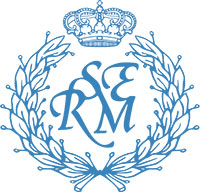
Nebrija University has maintained a collaboration agreement with the Royal Spanish Mathematical Society (RSME), since 2017, with the intention of creating a stable framework for cultural, scientific, and academic collaboration between both institutions.
The Royal Spanish Mathematical Society is an association, founded in 1911, which pursues the promotion and dissemination of mathematical sciences and their applications, as well as their research and teaching at all educational levels.
The agreement signed between the two institutions will facilitate the organization of activities, such as courses, conferences, seminars and conferences and promote the exchange of ideas and initiatives with the resources of both institutions. In addition, this framework implies collaboration in research, innovation and technological development programs for the study of mathematics and related studies.
Student profile: Those interested in studying and obtaining the Bachelor's Degree in Applied Mathematics from Nebrija University must have high school mathematical knowledge, aptitude for numerical and logical reasoning, as well as ease of understanding and reasoning abstract models that generalize the particular aspects of practical cases.
Graduate Profile: The graduate profile is that of people prepared to contribute their mathematical knowledge in interdisciplinary teams of companies, industries and consultancies, as well as in R+D+i units.
Specifically, these are profiles capable of:
· Establishing mathematical models, from a base of solid mathematical knowledge, to solve problems from different areas of science and technology, using the appropriate mathematical and digital tools.
· Taking on scientific challenges from other disciplines with an open and flexible mindset, both in the academic and professional environment, with initiative, solid decision-making, creativity and critical reasoning.
· Working in a multilingual and multidisciplinary environment.
· Advancing in autonomous learning, or taking postgraduate studies that allow them to delve into and/or specialize in different fields of application of Mathematics.
Official degree: Bachelor's Degree in Applied Mathematics
Centro responsable:Higher Polytechnic School
Branch of Knowledge: Engineering and Architecture
Places offered: 45
Total Credits 240 credits.
Minimum 12 ECTS credits and maximum 90 ECTS credits per enrollment and academic year
Academic year it was implemented: 2022-2023
Languages: Spanish
Teaching type: Classroom attendance
Academic Regulations: General student’s regulations. Credit transfer and recognition. Regulation of student participation. Common procedures for carrying out the Final Research Project
University Services: [+info]
It responds to the challenges posed by the connected industry and the digital economy
Curriculum
All our degrees and curricula have been prepared in accordance with the new guidelines set by current legislation, having already been verified by the National Agency for Quality Assessment The student must take 240 credits
First year 60 ECTS
First Semester 30 ECTS credits- 6 ECTS | Linear algebra
- 6 ECTS | Calculus I
- 6 ECTS | Introduction to mathematical language
- 6 ECTS | Mathematical models and graphs
- 6 ECTS | Development of professional competences I
Second Semester 30 ECTS credits- 6 ECTS | Linear geometry
- 6 ECTS | Calculus II
- 6 ECTS | Programming Fundamentals
- 6 ECTS | Physics models
- 6 ECTS | Introduction to data analysis
Second year 60 ECTS
First Semester 30 ECTS credits- 6 ECTS | Advanced calculus
- 6 ECTS | Ordinary differential equations
- 6 ECTS | Topology
- 6 ECTS | Optimization
- 6 ECTS | Numerical methods
Second Semester 30 ECTS credits- 6 ECTS | Integration and measurement
- 6 ECTS | Equations in partial derivatives
- 6 ECTS | Differential geometry
- 6 ECTS | Probability theory
- 6 ECTS | Development of the Participative and Solidarity Spirit
- 6 ECTS | Techno-ethics (EL)
Third year 60 ECTS
First Semester 30 ECTS credits- 6 ECTS | Complex variables
- 6 ECTS | Statistics
- 6 ECTS | Algebraic structures
- 6 ECTS | Advanced numerical methods
- 6 ECTS | Dynamic systems
Second Semester 30 ECTS credits- 6 ECTS | Stochastic processes
- 6 ECTS | Data science
- 6 ECTS | Algorithmic Algebra and Cryptography
- 6 ECTS | Geometry and computational topology
- 6 ECTS | Development of professional competences II
Fourth year 60 ECTS
First Semester 24 ECTS credits- 6 ECTS | Quantum Mechanics and Computing
- 6 ECTS | Robotics
- 6 ECTS | Mathematics for finance
- 6 ECTS | Biomathematics
- 6 ECTS | Technological project management
Second Semester 24 ECTS credits- 24 ECTS | Evaluation of the development of skills in the company
Yearly 12 ECTS credits- 12 ECTS | Final Research Project (FRP)
More information on these subjects
- 6 ECTS |
 Competence Development Seminar I
Competence Development Seminar I - 6 ECTS |
 Competence Development Seminar II
Competence Development Seminar II
The recognition of 6 credits will be arranged according to the different activities that the student carries out throughout his/her degree. They will be awarded for cultural activities, sports, student representation, solidarity and cooperation, and/or to attend one of the following subjects: Human Rights and Corporate Social Responsibility.
A program whose objective is to favor the practical training of the students, under the continuous supervision of the Department of Professional Careers of the University, the academic department corresponding to the degree and the company or collaborating institution where the internships are carried out. We provide advice on the choice of internships and follow-up and tutoring, always considering the professional orientation of each student.
More information on Internships in CompaniesThis project involves carrying out research tasks regarding different subjects by the student under the advice of one or several professors of the Department and, occasionally, professionals from the business world. For this, the student has the possibility to choose a project from among those offered.
Through the transversal subjects you will be able to complement your education and complete your CV in a practical, collaborative and fun way.
It is a voluntary program with no added cost. Upon completion, you will be provided with a diploma.
Access all the informationNebrija University, which is committed to languages and quality, provides the student with added value with the Diploma in English Professional Communication, which will allow him/her to achieve with confidence the competence demanded to successfully join the labor market.
It corresponds to level C1.
More information hereProfesores
|
Profesores (en el segundo año de implantación) Professors (in the second year of implementation) |
Porcentaje de Doctores Percentage of PhD holders |
| 18 | 56% |
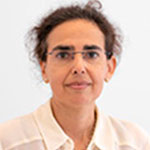 Carolina Andrea Mendoza Parra
Directora del grado en Matemáticas Aplicadas
Carolina Andrea Mendoza Parra
Directora del grado en Matemáticas AplicadasProfesora del área de Análisis Matemático Director of the Bachelor's Degree in Applied Mathematics
Professor of the area of Mathematical analysis Doctora por la Universidad de Navarra. Actualmente trabaja en flujos geofísicos en océanos y atmósfera. En particular, en el desarrollo de descriptores Lagrangianos para localizar estructuras coherentes en la superficie del Mar mediante datos satelitales. Acreditada como Profesor titular. Ha realizado estancias post-doctorales en el Instituto Nazionalle di Ottica (Florencia) Italia trabajando en sincronización de cadenas de osciladores, en el Instituto Max-Planck de Sistemas Complejos (Dresde)-Alemania y como profesor visitante en la Facultad de Earth, Ocean, & Environment de la Universidad de Delaware.
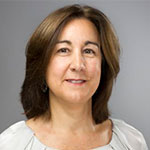 Mª Pilar Vélez Melón
Directora de la sección de Ciencias
Mª Pilar Vélez Melón
Directora de la sección de CienciasProfesora de área de Álgebra y Geometría Director of the Science section
Professor of the Algebra and Geometry area Doctora y licenciada en Ciencias Matemáticas por la Universidad Complutense de Madrid, ha desarrollado su actividad docente e investigadora en las Universidades Complutense, de Pisa (Italia) y Antonio de Nebrija. En esta última ha desempeñado los cargos de Coordinadora del Área de Matemática Aplicada, Jefe de Estudios y Directora del Departamento de Ingeniería Informática, Vicerrectora y Rectora. Profesor acreditado en las figuras de contratado doctor y profesor de universidad privada, con un sexenio de investigación reconocido. Participa como investigadora en un proyecto del Plan nacional de I+D+i y en una red temática de excelencia sobre Algebra computacional y aplicaciones. Sus trabajos de investigación se encuentran publicados en revistas indexadas, los últimos en Journal of Symbolic Computation, Revista Matemática Complutense, Mathematics o ACM. Así mismo, participa activamente en congresos y reuniones en los campos del Cálculo simbólico y de la Didáctica de las matemáticas, y forma parte de los comités científicos de conferencias internacionales. Es delegada de la Real Sociedad Matemática Española (RSME) en la Universidad Nebrija y preside la Comisión Profesiones y Empleabilidad de la RSME.
 Fernando Aguilar Galindo Ávila
Profesor del área de Competencias Profesionales
Professor of Professional Skills area
Fernando es Licenciado en Psicología Clínica por la Universidad de Comillas y posee la Especialidad de Psicología Industrial por la Universidad Complutense, además de ser Especialista en Psicología Aplicada a la Empresa por ICADE.
A lo largo de sus 30 años de experiencia profesional, ha desarrollado puestos de Dirección y Gerencia en Compañías multinacionales como Bossard, Gemini Consulting (Cap Gemini) MCC, Soluziona o Indra.
En la actualidad posee su propia compañía a través de la cual desarrolla Servicios Profesionales en materia de Recursos Humanos y, formando parte del equipo del Instituto Iñaki Piñuel, acciones como Consejo Psicológico, así como Prevención y Gestión de Riesgos Psicosociales.
Fernando Aguilar Galindo Ávila
Profesor del área de Competencias Profesionales
Professor of Professional Skills area
Fernando es Licenciado en Psicología Clínica por la Universidad de Comillas y posee la Especialidad de Psicología Industrial por la Universidad Complutense, además de ser Especialista en Psicología Aplicada a la Empresa por ICADE.
A lo largo de sus 30 años de experiencia profesional, ha desarrollado puestos de Dirección y Gerencia en Compañías multinacionales como Bossard, Gemini Consulting (Cap Gemini) MCC, Soluziona o Indra.
En la actualidad posee su propia compañía a través de la cual desarrolla Servicios Profesionales en materia de Recursos Humanos y, formando parte del equipo del Instituto Iñaki Piñuel, acciones como Consejo Psicológico, así como Prevención y Gestión de Riesgos Psicosociales.
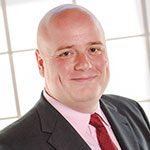 Carlos Aldama Saínz
Profesor de Tecno-Ética
Professor of Techno-Ethics
Ingeniero Superior en Informática por la Universidad Antonio de Nebrija, Ingeniero Técnico en Informática de Sistemas, con más de 25 años de experiencia en el sector, en los que he creado diferentes empresas dentro del sector TIC y realizado labores externas como consultor y auditor (siempre dentro del ámbito tecnológico).
Los últimos 15 años los ha enfocado en exclusiva al mundo forense como perito ingeniero en informática, realizando tareas relacionadas con la ciberseguridad y atacando los aspectos más complejos de la informática respecto a cuestiones de fugas de datos, ocultación de identidades, manipulación de información y/o detección de intrusión o exámenes de pruebas falsas aportadas a juzgados. Para estas labores ha creado y coordinado un equipo especializado bajo su propia empresa: Aldama Informática Legal.
Carlos Aldama Saínz
Profesor de Tecno-Ética
Professor of Techno-Ethics
Ingeniero Superior en Informática por la Universidad Antonio de Nebrija, Ingeniero Técnico en Informática de Sistemas, con más de 25 años de experiencia en el sector, en los que he creado diferentes empresas dentro del sector TIC y realizado labores externas como consultor y auditor (siempre dentro del ámbito tecnológico).
Los últimos 15 años los ha enfocado en exclusiva al mundo forense como perito ingeniero en informática, realizando tareas relacionadas con la ciberseguridad y atacando los aspectos más complejos de la informática respecto a cuestiones de fugas de datos, ocultación de identidades, manipulación de información y/o detección de intrusión o exámenes de pruebas falsas aportadas a juzgados. Para estas labores ha creado y coordinado un equipo especializado bajo su propia empresa: Aldama Informática Legal.
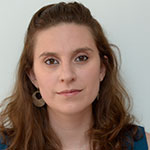 Alia Baroudi Guijarro
Directora del grado de Física Aplicada
Alia Baroudi Guijarro
Directora del grado de Física AplicadaProfesor del área de Fundamentos de la Física Director of the Applied Physics degree
Professor of the Fundamentals of Physics area Licenciada en Física por la Universidad Autónoma de Madrid y Doctora en Física por la Universidad Complutense de Madrid (UCM), investigando el desarrollo de nuevos materiales para la liberación controlada de diferentes principios activos, con la finalidad de optimizar la presencia de sustancias no biodegradables en el medio ambiente. Ha ampliado su formación con el Máster de Física Biomédica de la UCM y ha sido personal de apoyo a la investigación en la UCM.
 Alvaro Bustinduy Candelas
Vicerrector de Investigación
Alvaro Bustinduy Candelas
Vicerrector de InvestigaciónProfesor del área de Geometría diferencial Vice-Rector for Research
Professor of the area of Differential Geometry Doctor en Ciencias Matemáticas por la UCM. Acreditado como Profesor Titular y como Profesor Doctor de Universidad Privada. Mantiene líneas de investigación en el campo de las Ecuaciones Diferenciales y los Sistemas Dinámicos Complejos. Ha publicado trabajos de investigación en revistas matemáticas internacionales. Ha impartido conferencias en congresos internacionales. Participa en varios proyectos de investigación y colabora con investigadores de la UCM y Universidad Nacional Autónoma de México. En cuanto a su actividad docente, ha impartido en la Escuela Politécnica Superior de la Universidad Antonio de Nebrija desde el curso 2003-04 hasta la actualidad diferentes asignaturas a todos los niveles (primer y segundo ciclo, doctorado) del área de matemáticas y la programación, incluidas asignaturas de diferentes titulaciones del campo de la Ingeniería Informática. Actualmente compagina su actividad docente e investigadora con el cargo de Vicerrector de Investigación de la Universidad.
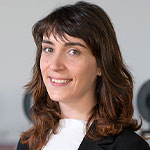 Nieves Cubo Mateo
IP del grupo de investigación Nebrija Inteligencia artificial y sistemas emergentes
Nieves Cubo Mateo
IP del grupo de investigación Nebrija Inteligencia artificial y sistemas emergentesProfesora del área de ingeniería del software, sistemas de información y sistemas inteligentes IP of the Nebrija research group Artificial intelligence and emerging systems
Professor in the area of software engineering, information systems and intelligent systems Pionera en la Impresión 3D de tejidos humanos. Doctora en Farmacia por la Universidad Complutense de Madrid, e Ingeniería en Electrónica Industrial y Automática por la Universidad Carlos III de Madrid, donde también obtuvo el título de Máster en Ciencia e Ingeniería de Materiales. Evaluada positivamente por la ANECA en la categoría de Ayudante Doctor. Ha impartido docencia en la Universidad Internacional de Valencia, en el Grado de Informática (2021-2022) y en el Máster de Bioingeniería (2019-2022). También ha dado clase en la Escuela de Diseño Mecánico (EDDM) en el Máster de Fabricación Aditiva (MIFA) y en curso experto en impresión 3D Biomédico. Actualmente es profesora en el Grado en Ingeniería Informática. A nivel de investigación, ha publicado trabajos científicos dentro del área de la Bioingeniería en diferentes revistas internacionales (primer cuartil). Ha impartido conferencias en congresos internacionales y realizado estancias en el extranjero (Dresden, Alemania). Ha participado en varios proyectos de investigación (Plan Nacional de I+D+i , empresa privada e internacionales) y colabora con investigadores de la UCM, CSIC y la Technische Universität Dresden. Su investigación se centra en modelos y soluciones computacionales dentro del ámbito de la Bioingeniería y del Espacio, donde colabora con la Agencia Espacial Europea.
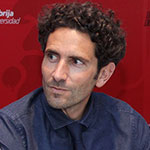 David de la Fuente Franco
Profesor del área de Desarrollo del espíritu participativo y solidario
Professor in the area of Development of the participatory and supportive spirit
Graduado en Educación Física por la Universidad Complutense de Madrid y Máster Universitario en Gestión Deportiva por la Universidad de Valencia. Está cursando el doctorado y su ámbito de investigación son las Empresas Saludables. Su trayectoria ha estado siempre ligada al mundo del deporte; en un primer momento en el ámbito escolar, pasando por la gestión municipal de instalaciones deportivas y acabando en la educación superior universitaria. Es director del Servicio de Deportes, Clubes y Bienestar de la Universidad Nebrija (Madrid) desde 2005, miembro permanente del Comité Madrileño de Deporte Universitario (COMADU) y del Comité Español de Deporte Universitario (CEDU), así como Asesor Técnico de diferentes modalidades deportivas para el Observatorio de Deporte Universitario de la Comunidad de Madrid. Forma parte del Comité Organizador de los Campeonatos Universitarios de la Comunidad de Madrid y de los Campeonatos Universitarios de España. Dirige el Programa Saludable de Actividad Física y Deporte para empleados de la Universidad Nebrija.
David de la Fuente Franco
Profesor del área de Desarrollo del espíritu participativo y solidario
Professor in the area of Development of the participatory and supportive spirit
Graduado en Educación Física por la Universidad Complutense de Madrid y Máster Universitario en Gestión Deportiva por la Universidad de Valencia. Está cursando el doctorado y su ámbito de investigación son las Empresas Saludables. Su trayectoria ha estado siempre ligada al mundo del deporte; en un primer momento en el ámbito escolar, pasando por la gestión municipal de instalaciones deportivas y acabando en la educación superior universitaria. Es director del Servicio de Deportes, Clubes y Bienestar de la Universidad Nebrija (Madrid) desde 2005, miembro permanente del Comité Madrileño de Deporte Universitario (COMADU) y del Comité Español de Deporte Universitario (CEDU), así como Asesor Técnico de diferentes modalidades deportivas para el Observatorio de Deporte Universitario de la Comunidad de Madrid. Forma parte del Comité Organizador de los Campeonatos Universitarios de la Comunidad de Madrid y de los Campeonatos Universitarios de España. Dirige el Programa Saludable de Actividad Física y Deporte para empleados de la Universidad Nebrija.
 Crisanto de los Santos Durán
Profesor del área de Estadística
Professor of the Statistics area
Licenciado en Matemáticas, especialidad Estadística e Investigación Operativa, por la Universidad Complutense de Madrid. Miembro de los grupos de análisis multivariante y clasificación y análisis de datos funcionales de la Sociedad de estadística e investigación operativa.
Experimentado director de analítica avanzada e inteligencia de clientes con una extensa trayectoria en consultoría y servicios de información en compañías como Nielsen, Information Resources, Nexium, Keywave. Experto en comercio y bienes de consumo masivo (FMCG), realizando numerosos proyectos de optimización y mejora del negocio con empresas lideres del sector de gran consumo y distribución con experiencia en el desarrollo de proyectos internacionales de ámbito global.
Crisanto de los Santos Durán
Profesor del área de Estadística
Professor of the Statistics area
Licenciado en Matemáticas, especialidad Estadística e Investigación Operativa, por la Universidad Complutense de Madrid. Miembro de los grupos de análisis multivariante y clasificación y análisis de datos funcionales de la Sociedad de estadística e investigación operativa.
Experimentado director de analítica avanzada e inteligencia de clientes con una extensa trayectoria en consultoría y servicios de información en compañías como Nielsen, Information Resources, Nexium, Keywave. Experto en comercio y bienes de consumo masivo (FMCG), realizando numerosos proyectos de optimización y mejora del negocio con empresas lideres del sector de gran consumo y distribución con experiencia en el desarrollo de proyectos internacionales de ámbito global.
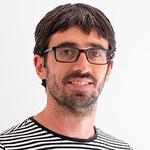 Diego de Pereda Sebastián
Profesor del área de Estadística
Professor of the Statistics area
Profesor Doctor en Matemáticas por la Universidad Politécnica de Valencia, investigando sobre el tratamiento de la incertidumbre y la variabilidad aplicado al desarrollo de un páncreas artificial para pacientes con diabetes tipo I. Está acreditado y es licenciado en Matemáticas por la Universidad Autónoma de Madrid. Máster en Investigación Matemática por la Universidad Complutense de Madrid. Ha trabajado como analista estadístico de series temporales para la optimización de recursos (Business Inteligence). También ha trabajado como de investigador bioinformático en el modelado del funcionamiento del sistema inmune mediante algoritmos de inteligencia artificial y métodos estadísticos.
Diego de Pereda Sebastián
Profesor del área de Estadística
Professor of the Statistics area
Profesor Doctor en Matemáticas por la Universidad Politécnica de Valencia, investigando sobre el tratamiento de la incertidumbre y la variabilidad aplicado al desarrollo de un páncreas artificial para pacientes con diabetes tipo I. Está acreditado y es licenciado en Matemáticas por la Universidad Autónoma de Madrid. Máster en Investigación Matemática por la Universidad Complutense de Madrid. Ha trabajado como analista estadístico de series temporales para la optimización de recursos (Business Inteligence). También ha trabajado como de investigador bioinformático en el modelado del funcionamiento del sistema inmune mediante algoritmos de inteligencia artificial y métodos estadísticos.
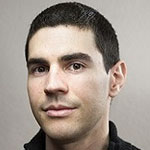 Omar Díaz Luque
Profesor del área de Fundamentos de la Física
Professor of the Fundamentals of Physics area
Graduado en Ciencias Físicas por la Universidad Complutense de Madrid, en la especialidad de Física aplicada. Máster en Nanofísica y Materiales Avanzados por la misma Universidad. Doctorando en la Universidad Antonio de Nebrija. Ha realizado colaboraciones en actividades y proyectos con la Universidad Complutense, el Instituto de Magnetismo Aplicado y la Universidad Antonio de Nebrija.
Omar Díaz Luque
Profesor del área de Fundamentos de la Física
Professor of the Fundamentals of Physics area
Graduado en Ciencias Físicas por la Universidad Complutense de Madrid, en la especialidad de Física aplicada. Máster en Nanofísica y Materiales Avanzados por la misma Universidad. Doctorando en la Universidad Antonio de Nebrija. Ha realizado colaboraciones en actividades y proyectos con la Universidad Complutense, el Instituto de Magnetismo Aplicado y la Universidad Antonio de Nebrija.
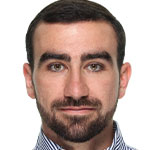 Andrés Díaz Selvi
Profesor del área de Análisis Matemático
Professor of the area of Mathematical Analysis
Graduado en Matemáticas por la Universidad Complutense de Madrid, con especialización en Matemática Pura y Aplicada. Título de Master of Science en Matemáticas Puras otorgado por el Imperial College London. El trabajo de fin de máster, titulado "Spectral properties of the Coulomb Hamiltonian", combina la teoría espectral y la matemática física. Realizado bajo la supervisión de Ari Laptev.
Becario de investigación del ICMAT gracias a la ayuda JAE INTRO CSIC 2022. Doctorando bajo la supervisión de Eva A. Gallardo y Daniel Seco en cuestiones relacionadas con propiedades de subespacios invariantes en el contexto de espacios de funciones analíticas.
Andrés Díaz Selvi
Profesor del área de Análisis Matemático
Professor of the area of Mathematical Analysis
Graduado en Matemáticas por la Universidad Complutense de Madrid, con especialización en Matemática Pura y Aplicada. Título de Master of Science en Matemáticas Puras otorgado por el Imperial College London. El trabajo de fin de máster, titulado "Spectral properties of the Coulomb Hamiltonian", combina la teoría espectral y la matemática física. Realizado bajo la supervisión de Ari Laptev.
Becario de investigación del ICMAT gracias a la ayuda JAE INTRO CSIC 2022. Doctorando bajo la supervisión de Eva A. Gallardo y Daniel Seco en cuestiones relacionadas con propiedades de subespacios invariantes en el contexto de espacios de funciones analíticas.
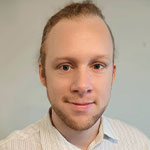 Jacob Ryan Goodman
Profesor del área de Análisis Matemático
Professor of the area of Mathematical Analysis
Doctor en Matemáticas por la Universidad Autónoma de Madrid. Bachelor of Science en Matemáticas y Física por la Universidad de Michigan en Los Estados Unidos. Durante sus estudios de doctorado fue becado por el programa Severo Ochoa del ICMAT y por la Fundación La Caixa. Su línea de investigación se centra en la planificación de trayectorias variacionales de segundo orden sobre variedades de Riemann y su aplicación a sistemas robóticos. En particular, busca encontrar un equilibrio entre la optimización (trayectorias de energía mínima) y la finalización de algunas tareas (como evitar obstáculos). La aplicación principal que se considera implica equipos de drones quadrotor que transportan una carga a través de cables elásticos. Ha impartido docencia como profesor ayudante en la Universidad de Michigan y en la Universidad Autónoma de Madrid.
Jacob Ryan Goodman
Profesor del área de Análisis Matemático
Professor of the area of Mathematical Analysis
Doctor en Matemáticas por la Universidad Autónoma de Madrid. Bachelor of Science en Matemáticas y Física por la Universidad de Michigan en Los Estados Unidos. Durante sus estudios de doctorado fue becado por el programa Severo Ochoa del ICMAT y por la Fundación La Caixa. Su línea de investigación se centra en la planificación de trayectorias variacionales de segundo orden sobre variedades de Riemann y su aplicación a sistemas robóticos. En particular, busca encontrar un equilibrio entre la optimización (trayectorias de energía mínima) y la finalización de algunas tareas (como evitar obstáculos). La aplicación principal que se considera implica equipos de drones quadrotor que transportan una carga a través de cables elásticos. Ha impartido docencia como profesor ayudante en la Universidad de Michigan y en la Universidad Autónoma de Madrid.
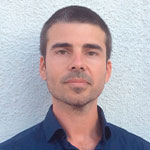 Eduardo Iglesias Jiménez
Profesor del área de Fundamentos de la Física
Professor of the Fundamentals of Physics area
Doctor Cum Laude en Sociología y Antropología Social por la Universidad Complutense de Madrid (2018); Máster (2013) y Licenciado (2012) en Antropología Social y Cultural por la UCM; Doctor Cum Laude en Química por la UCM (2008) y Licenciado en Física por la Universidad de Santiago de Compostela (2003).
Profesor Dr. acreditado, investigador y consultor. Antropólogo y físico, docente universitario en las áreas de la Física fundamental y Biofísica, y en el campo de los Derechos Humanos,
políticas públicas y minorías desde la Antropología Social, en las Universidades Pontificia de Comillas, Nebrija, Alfonso X El Sabio y el Institute of American Universities. Investigador multidisciplinar, ha participado en proyectos nacionales e internacionales en el campo de la energía nuclear en CIEMAT-Madrid y en la evaluación del impacto social de la tecnología en individuos y grupos humanos. Ha asistido como ponente a diversos congresos nacionales e internacionales y forma parte de la European Association of Social Anthropology; del grupo POLITIS [Diseño de políticas: transferencia e innovación social] de la UCM y es Research Fellow en The Ferderman Cyber Security Research Center - Hebrew University of Jerusalem, investigando en el campo de la discriminación y sesgos en algoritmos de IA y decisores automáticos, tratamiento de la diversidad, identidad, redes de influencia y relaciones de poder entre grupos culturales. Como consultor, dirige Ångstrom Consulting y co-dirige el área de Derechos Humanos y Empresa en el Instituto Berg de Derechos Humanos, como asesor a empresas en la evaluación de impacto en Derechos Humanos en la cadena de valor y suministro.
Eduardo Iglesias Jiménez
Profesor del área de Fundamentos de la Física
Professor of the Fundamentals of Physics area
Doctor Cum Laude en Sociología y Antropología Social por la Universidad Complutense de Madrid (2018); Máster (2013) y Licenciado (2012) en Antropología Social y Cultural por la UCM; Doctor Cum Laude en Química por la UCM (2008) y Licenciado en Física por la Universidad de Santiago de Compostela (2003).
Profesor Dr. acreditado, investigador y consultor. Antropólogo y físico, docente universitario en las áreas de la Física fundamental y Biofísica, y en el campo de los Derechos Humanos,
políticas públicas y minorías desde la Antropología Social, en las Universidades Pontificia de Comillas, Nebrija, Alfonso X El Sabio y el Institute of American Universities. Investigador multidisciplinar, ha participado en proyectos nacionales e internacionales en el campo de la energía nuclear en CIEMAT-Madrid y en la evaluación del impacto social de la tecnología en individuos y grupos humanos. Ha asistido como ponente a diversos congresos nacionales e internacionales y forma parte de la European Association of Social Anthropology; del grupo POLITIS [Diseño de políticas: transferencia e innovación social] de la UCM y es Research Fellow en The Ferderman Cyber Security Research Center - Hebrew University of Jerusalem, investigando en el campo de la discriminación y sesgos en algoritmos de IA y decisores automáticos, tratamiento de la diversidad, identidad, redes de influencia y relaciones de poder entre grupos culturales. Como consultor, dirige Ångstrom Consulting y co-dirige el área de Derechos Humanos y Empresa en el Instituto Berg de Derechos Humanos, como asesor a empresas en la evaluación de impacto en Derechos Humanos en la cadena de valor y suministro.
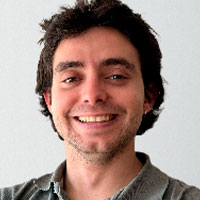 Pablo Lobato de la Cruz
Profesor del área de Matemática aplicada
Professor of the area of Applied Mathematics
Graduado en Matemáticas en la especialidad de ciencias de la computación, por la Universidad Complutense de Madrid. En mi trabajo de fin de grado analizo eficiencia y corrección de un algoritmo cuántico de sistemas de recomendación. Actualmente aplicando mis conocimientos matemáticos en Repsol.
Pablo Lobato de la Cruz
Profesor del área de Matemática aplicada
Professor of the area of Applied Mathematics
Graduado en Matemáticas en la especialidad de ciencias de la computación, por la Universidad Complutense de Madrid. En mi trabajo de fin de grado analizo eficiencia y corrección de un algoritmo cuántico de sistemas de recomendación. Actualmente aplicando mis conocimientos matemáticos en Repsol.
 Jorge Marco Blanco
Profesor del área de Estadística
Professor of the Statistics area
Licenciado en Ciencias Físicas con Máster en Matemática Aplicada e Inteligencia Artificial, especializado en Aprendizaje Profundo. Con más de 19 años de experiencia en análisis y tratamiento de datos, es experto en modelos predictivos, clasificación, detección de fraude y desarrollo de APIs, aplicados a campos como energías renovables, banca, e-commerce y marketing digital. Investigador en el Big Data Institute del Banco Santander y la Universidad Carlos III, donde utiliza IA y Aprendizaje Profundo para identificar fraudes publicitarios online, aumentando la transparencia en Internet.
Jorge Marco Blanco
Profesor del área de Estadística
Professor of the Statistics area
Licenciado en Ciencias Físicas con Máster en Matemática Aplicada e Inteligencia Artificial, especializado en Aprendizaje Profundo. Con más de 19 años de experiencia en análisis y tratamiento de datos, es experto en modelos predictivos, clasificación, detección de fraude y desarrollo de APIs, aplicados a campos como energías renovables, banca, e-commerce y marketing digital. Investigador en el Big Data Institute del Banco Santander y la Universidad Carlos III, donde utiliza IA y Aprendizaje Profundo para identificar fraudes publicitarios online, aumentando la transparencia en Internet.
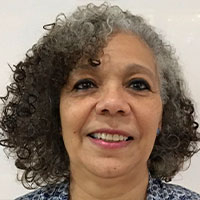 Brigida Molina Carabaño
Profesora del área de Análisis Matemático
Professor of the Mathematical Analysis area
Licenciada y Magister en Matemáticas por la Universidad Central de
Venezuela (UCV). Doctorado en Ciencias de la Computación por la UCV en
cooperación con el Laboratorio LIP6 de la Universidad Pierre y Marie Curie,
París, Francia. Postdoctorado en la Universidad de Ciencias y Tecnologías
de Lille, Francia. Ha impartido clases en el área de matemáticas aplicadas,
tanto en pregrado como en postgrado, en la UCV y en universidades privadas
de Lima, Perú. Ha sido profesora invitada en diversas instituciones y
conferencias internacionales. Sus intereses de investigación incluyen
algoritmos para cálculos a gran escala, simulación de yacimientos y métodos
del álgebra lineal para el análisis de datos. Ha publicado en revistas
científicas indexadas.
Brigida Molina Carabaño
Profesora del área de Análisis Matemático
Professor of the Mathematical Analysis area
Licenciada y Magister en Matemáticas por la Universidad Central de
Venezuela (UCV). Doctorado en Ciencias de la Computación por la UCV en
cooperación con el Laboratorio LIP6 de la Universidad Pierre y Marie Curie,
París, Francia. Postdoctorado en la Universidad de Ciencias y Tecnologías
de Lille, Francia. Ha impartido clases en el área de matemáticas aplicadas,
tanto en pregrado como en postgrado, en la UCV y en universidades privadas
de Lima, Perú. Ha sido profesora invitada en diversas instituciones y
conferencias internacionales. Sus intereses de investigación incluyen
algoritmos para cálculos a gran escala, simulación de yacimientos y métodos
del álgebra lineal para el análisis de datos. Ha publicado en revistas
científicas indexadas.
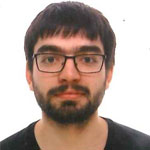 Alvaro Pereira Albert
Profesor del área de Geometría y Topología
Professor of the area of Geometry and Topology
Graduado en Matemáticas por la Universidad Autónoma de Madrid. Está cursando actualmente el Máster universitario en formación del profesorado de educación secundaria obligatoria y bachillerato, formación profesional y enseñanzas de idiomas. Profesor asociado en la Escuela Politécnica Superior de la Universidad Nebrija.
Alvaro Pereira Albert
Profesor del área de Geometría y Topología
Professor of the area of Geometry and Topology
Graduado en Matemáticas por la Universidad Autónoma de Madrid. Está cursando actualmente el Máster universitario en formación del profesorado de educación secundaria obligatoria y bachillerato, formación profesional y enseñanzas de idiomas. Profesor asociado en la Escuela Politécnica Superior de la Universidad Nebrija.
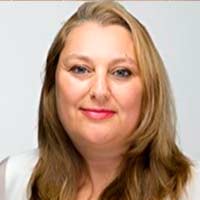 Mª Rosario Rubio San Miguel
Jefa de estudios de la Escuela Politécnica Superior
Mª Rosario Rubio San Miguel
Jefa de estudios de la Escuela Politécnica SuperiorProfesora del área de Álgebra y Geometría Head of Studies at the Higher Polytechnic School
Professor of the area of Algebra and Geometry Doctora en Ciencias Matemáticas en enero de 2001 por la Universidad de Cantabria. Evaluación positiva de ANECA en las figuras de profesor Contratado Doctor y Profesor de Universidad Privada en abril de 2004.Ha publicado en diversas revistas indexadas, capítulos de libros editados por editoriales prestigiosas y en conferencias internacionales en el Área del Álgebra Computacional. Desde febrero de 2001 es profesora en la Universidad Antonio de Nebrija.
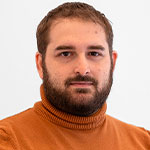 Emilio Trigueros Páez
Profesor del área de Matemática aplicada
Professor of the area of Applied Mathematics
Doctor en Astrofísica por la Universidad de Alicante, Licenciado en Física por la Universidad de La Laguna y Master en Astrofísica por la Universidad Complutense de Madrid y. Ha publicado en diferentes revistas indexadas del primer cuartil, y participado en conferencias internacionales en el área de Astrofísica Estelar. Docente en la Universidad Antonio de Nebrija.
Emilio Trigueros Páez
Profesor del área de Matemática aplicada
Professor of the area of Applied Mathematics
Doctor en Astrofísica por la Universidad de Alicante, Licenciado en Física por la Universidad de La Laguna y Master en Astrofísica por la Universidad Complutense de Madrid y. Ha publicado en diferentes revistas indexadas del primer cuartil, y participado en conferencias internacionales en el área de Astrofísica Estelar. Docente en la Universidad Antonio de Nebrija.
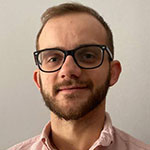 Pablo Yuste Rodríguez-Escalona
Profesor del área de Programación
Professor of the Programming area
Ingeniero en Tecnologías de Telecomunicación por la Universidad Carlos III de Madrid. Ha completado el Máster Universitario en Ingeniería de Telecomunicación en la Universidad Carlos III de Madrid y el Máster Universitario en Educación Secundaria en la Universidad Camilo José Cela. Presenta experiencia investigadora en el grupo GAST de la Universidad Carlos III de Madrid, en el diseño de modelos de aprendizaje automático y desarrollo de una aplicación móvil para ayudar a la movilidad en ciudades inteligentes. Actualmente realiza un doctorado industrial en BQ Educación, en colaboración con la Universidad Carlos III de Madrid, cuya tesis consiste en el desarrollo, implementación y evaluación de modelos de inteligencia artificial aplicados al aprendizaje personalizado.
Pablo Yuste Rodríguez-Escalona
Profesor del área de Programación
Professor of the Programming area
Ingeniero en Tecnologías de Telecomunicación por la Universidad Carlos III de Madrid. Ha completado el Máster Universitario en Ingeniería de Telecomunicación en la Universidad Carlos III de Madrid y el Máster Universitario en Educación Secundaria en la Universidad Camilo José Cela. Presenta experiencia investigadora en el grupo GAST de la Universidad Carlos III de Madrid, en el diseño de modelos de aprendizaje automático y desarrollo de una aplicación móvil para ayudar a la movilidad en ciudades inteligentes. Actualmente realiza un doctorado industrial en BQ Educación, en colaboración con la Universidad Carlos III de Madrid, cuya tesis consiste en el desarrollo, implementación y evaluación de modelos de inteligencia artificial aplicados al aprendizaje personalizado.
More Academic Information
Competences
Basic CompetencesThe basic competencies for bachelor's degree studies according to RD1393/2007, of October 29, modified by Royal Decree 861/2010, of July 2, are the following:
- BC1. That students demonstrate that they possess and understand knowledge in an area of study starting from the basis of general secondary education, and is usually found at a level that, although supported by advanced textbooks, also includes some aspects that imply knowledge from the forefront of your field of study;
- BC2. That students know how to apply their knowledge to their work or vocation in a professional way, and possess the competences that are usually demonstrated through the elaboration and defense of arguments and the resolution of problems within their area of study;
- BC3. That students have the ability to gather and interpret relevant data to make judgments that include a reflection on relevant issues of a social, scientific or ethical nature;
- BC4. That students can transmit information, ideas, problems and solutions to both a specialized and non-specialized audience;
- BC5. That students develop the learning skills necessary to undertake further studies with a high degree of autonomy.
In order to establish the general competences of the degree, the general objectives defined in the White Book of the Bachelor's Degree in Mathematics were taken as a reference and adapted (ANECA, 2004).
- GC1. (Know) Demonstrate possessing and understanding, from the basis of secondary education, the nature, concepts, methods and most relevant results of the different fields of Mathematics.
- GC2. (Apply) Know how to apply the knowledge acquired in the definition and approach of problems and in the search for their solutions in mathematical and non-mathematical contexts.
- GC3. (Analyze) Have the ability to gather and interpret relevant data in areas related to Mathematics, applying intuition and logical thinking, to reflect on relevant issues of a scientific, social or ethical nature.
- GC4. (Synthesize) Synthesize knowledge and skills acquired in the different subjects of the curriculum to apply them in specialized projects or in the work environment.
- GC5. (Learn) Develop those learning skills necessary to undertake, with a high degree of autonomy, subsequent specialized studies in the field of mathematics or in any other discipline that requires knowledge of mathematics.
- TC1. (Communicate) Communicate orally or in writing information, ideas, problems and solutions to both specialized and non-specialized audiences.
- TC2. (Use tools) Identify and know the basic computer tools that serve as a support instrument for academic and professional work.
- TC3. (Interact) Know how to apply skills in interpersonal relationships to solve in a practical way the personal or technical situations that arise.
- TC4. (Critical reasoning) Reasoning critically, relying on the information available, checking or refuting through reason the arguments of other people.
- TC5. (Teamwork) Knowing how to work as a team, actively contributing to the result of the problem or project to be solved.
- TC6. (Autonomy) Autonomously learn new knowledge and techniques to adapt to new situations in the environment of Applied Mathematics or others.
The list of specific competences for this degree takes as references the White Book of the Bachelor's Degree in Mathematics (ANECA, 2004) and the report "The integration of Mathematics studies in Spain in the European Higher Education Area", prepared by the Grupo CRUE de Matemáticas and published as a supplement to the Gazette of the Royal Spanish Mathematical Society (RSME) in volume 6, issue 2 of 2003. They have been adjusted to the profile of a graduate in Applied Mathematics from the Antonio de Nebrija University, and are the following:
- SC1. (Understand) Understand mathematical language to use it fluently.
- SC2. (Assimilate) Relate the definition of new mathematical objects with other known ones to assimilate them and deduce their properties.
- SC3. (Demonstrate) Identify the essential ideas of the proofs of some basic theorems, knowing how to adapt them to obtain other results.
- SC4. (Abstract) Know how to abstract structural properties, distinguishing them from those that are purely occasional, to formulate hypotheses and know how to confirm or refute them.
- SC5. (Solve) Acquire the appropriate mathematical techniques and tools to plan the resolution of mathematical problems.
- SC6. (Modeling) Use the most appropriate mathematical tools for the purposes to propose, analyze, validate and interpret simple mathematical models.
- SC7. (Instrumentalize) Use appropriate computer applications to experiment in mathematics, solve problems, and handle mathematical models.
- SC8. (Program) Develop programs that solve problems or mathematical models using the appropriate computational environment in each case.
- SC9. (Interpret) Acquire basic knowledge of other disciplines to know how to interpret complex situations arising from these in mathematical terms.
- SC10. (Conclude) Know how to draw conclusions from the results of the mathematical analysis of real situations and phenomena to integrate them into other areas.
- SC11. (Expand) Know the mathematics involved in other areas at the forefront of science and engineering to acquire focus towards the professional future.
- SC12. (Integrate) Carry out, present and defend before a university tribunal an individual work that integrates and synthesizes the knowledge and skills acquired.
Admission Requirements
For the purposes of pre-admission and admission, the evaluation of the candidate will be made with a scale of 0 to 10 points taking into account the following criteria and percentages:
- Academic record/transcript of the student's path of origin: 60%.
- Multiple-choice psychotechnical test: Evaluation 5%.
This test consists of a personality assessment test that explores the emotional, intellectual, social and norms and values aspects of each candidate of the Bachelor's Degree in Applied Mathematics at the Antonio de Nebrija University.
- English level test: Evaluation 5%.
The English level tests consist of a written exam with multiple-choice questions, oral and written comprehension, and use of the language, and last 60 minutes. They are taken in person or online, and are held in computer rooms on each campus, with professors from the Institute of Modern Languages.
In order to facilitate the acquisition of knowledge in the English language, the Vice-Rector’s Office of Academic Organization and Faculty has made the “Diploma in English Professional Communication” available to its students to guarantee their competence in the English language, making their future integration and professional mobility easier in any national and international environment.
In order to know students' real level of English knowledge, the Institute of Modern Languages conducts a language placement test. From the results of this test, students are placed at their corresponding level for the "Diploma in English Professional Communication", which the students take simultaneously to their chosen Bachelor's Degree.
It will not be necessary for the candidate to take the language placement test if they submit a document that proves their level of English. The level accreditation will be validated through the official diplomas that appear in the table of certificates accepted by ACLES. They are valid for one year.
- Specific test of knowledge about the Bachelor's Degree in Applied Mathematics: Evaluation 10%.
This is a multiple-choice test and consists mainly of specific content related to mathematics at the secondary school level, as well as questions of logical reasoning.
- Personal interview: Evaluation 20%.
As a strategy to know the characteristics of the applicants, the academic department will try to determine if the candidate has sufficient motivation, training and knowledge, skills, aptitudes, communication skills, extracurricular activities and future interests necessary to be admitted to the Antonio de Nebrija University as a student in the Bachelor's Degree in Applied Mathematics. Generally, it is the coordinator of the degree who conducts this interview and establishes a first contact with the candidate. In this way, the candidate identifies the coordinator as a reference point of the degree before even entering the university.
The Admissions Committee will meet according to needs and will communicate the result of the admission to the candidate by email, telephone and letter so that they can proceed to enrollment.
Employability
Carreer oportunities
The Department of Professional Careers carries out important work through orientation, counseling, professional intermediation and approach to employment and the professional reality of the students and former students of Nebrija University.
Regarding its role in the curricular internships, it carries out labor intermediation (search for opportunities for the student, pre-selection and sending of candidates to companies, relations with companies and institutions, and recruitment and loyalty of companies to carry out student internships), organizes University-Company meetings and manages Administrative Internships in Companies (contact with HR technicians and formalization of Educational Collaboration Agreements).
The University currently has over 3000 signed agreements with collaborating companies for training internships.
Below is a selection of companies with a current agreement that could incorporate students of the Bachelor's degree in Applied Mathematics:
Employability recognized in the Rankings
The commitment of Nebrija University to the academic requirement, training in leading companies and institutions, innovation in multidisciplinary programs and international projection, places the University in the top positions of the most important rankings.
The International Ranking QS Stars awards Nebrija University the maximum score in the quality and satisfaction of students in teaching, employability of the graduates and the internationalization of the institution.
The national rankings also recognize Nebrija University as the first Spanish university in teaching and second in employability, highlighting its performance in research, knowledge transfer and internationalization.
The Bologna Declaration formalized the principles on which the European Higher Education Area should be based: quality, mobility, diversity, competitiveness and employment growth.
From this, Nebrija stands as an academic model of reference, educating students with excellent individual behavior, interaction with their environment and motivated by and for constant and continuous training. The Nebrija Institute of Professional Skills works every day to achieve the differentiation of our students through the development of attitudes and skills.
The main objective is for students to achieve the best of themselves through the development and empowerment of their personal skills and resources through personal self-knowledge.
In addition, some of the professional skills that are worked on within the three seminars are those related to interpersonal skills and active communication skills and negotiation, indispensable for our students to know how to transmit ideas, to argue them, to provide information and opinions in an adequate, clear and convincing way.
Within what will be their work performance, other aspects such as teamwork, conflict resolution and project management ability will be worked on.
In the third block, skills worked on are those aimed at increasing the student's employability. They will work with tools and techniques for job searching, and perform tasks that achieve in the student a greater use of their personal skills.
For all this we have currently active experts in selection of people, professionals dedicated to personal and professional training and professionals dedicated to the world of communication and the arts.
In this way, and in a complementary way to his/her specific training, we help the student create a differentiating pattern in the social and business environment in which he/she will be immersed when he/she finishes his/her studies.
International
Some of the Universities with which Nebrija University has established agreements:
NOTE: The destination universities, offered by degree, may vary depending on the International Mobility Program. To obtain more up-to-date information, students can consult the online information at the International Mobility Program.
Several universities have special academic or linguistic requirements. For more information, please see the following link.
Certain destination universities may require the submission of a portfolio to request admission as an exchange student. In this case, the student must request advice from the Academic Department to prepare it.
Testimonials
University life in Applied Mathematics
Visit all the Activities of the Higher Polytechnic School
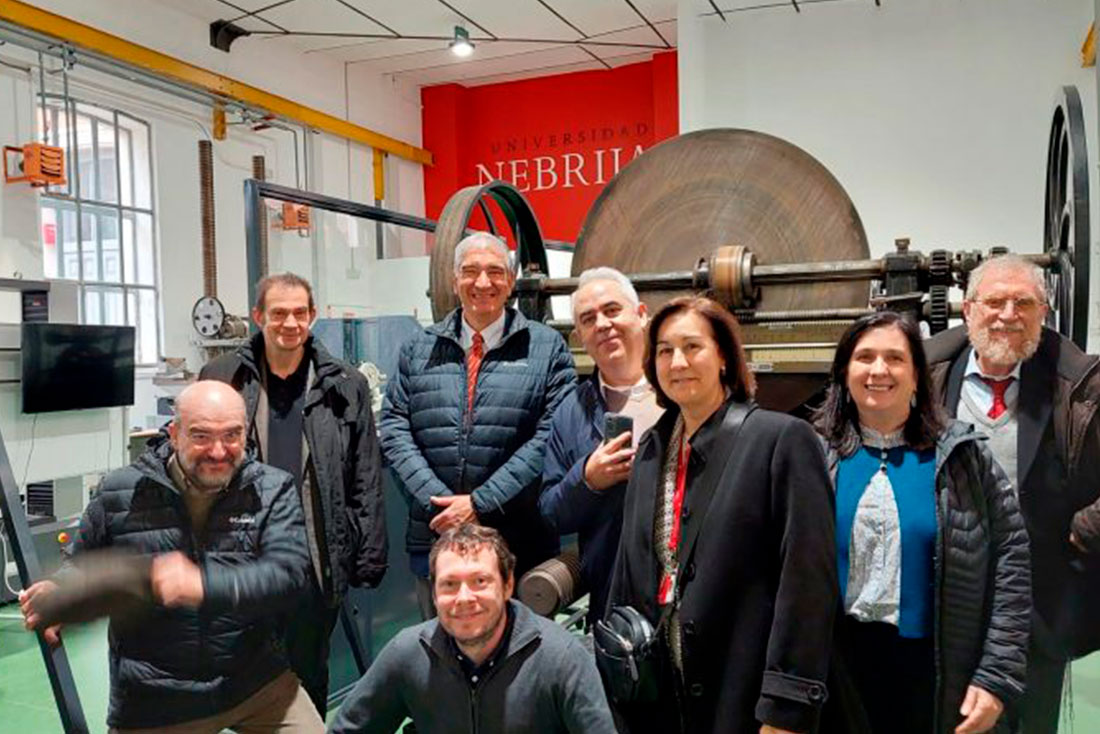
The Mathematics and its Applications group receives a visit from mathematicians Dana-Picard, Kovács and Vajda
From February 20 to 24, the Polytechnic school hosted visiting professors Noah Dana-Picard (Jerusalem College of Technology), Zoltán Kovács (PH Linz and JKU Linz) and Robert Vajda (Bolay Institute, Szeged University). The professors collaborate with researchers from the Mathematics and its Applications group in the development of automatic reasoning systems based on dynamic geometry (DGS) and computational algebra (CAS) for teaching and learning geometry.
See article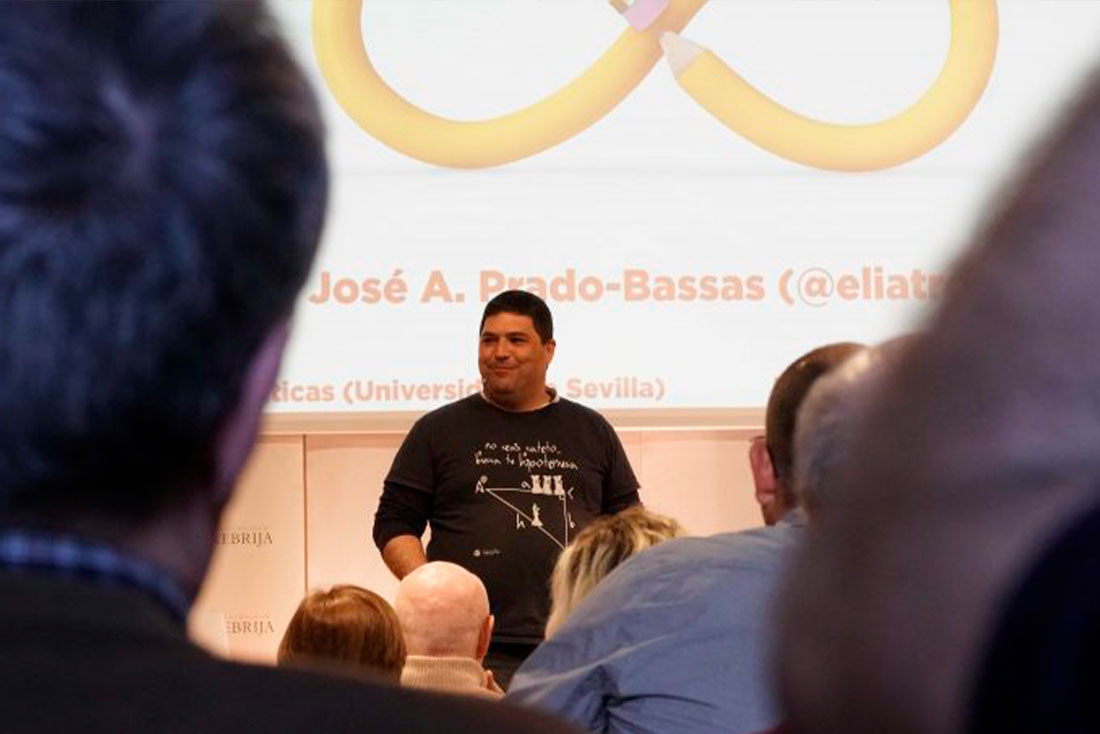
An infinite symphony of numbers
José A. Prado Bassas was in charge of raising the curtain to talk about his book, Historias del infinito. Considered to be one of the most enigmatic concepts, the term infinite in mathematics refers to what has no end, for example, the set of natural numbers. In a presentation that did not lack a sense of humor, Bassas stressed that "one doesn't mess around with infinity", and shared with the audience a collection of paradoxes about infinity. For example “the paradox of the sausage. You cannot eat a whole sausage. You eat half, then half of half, later half of half of half and so on. You would never finish the sausage.”
See articleMathematics and Physics in the digital age
Session that addressed the challenges and opportunities of mathematicians and physicists in the digital age, interdisciplinarity, innovation and technology, as well as the bachelor's degrees in Applied Mathematics and Applied Physics (and its double degree) launched by the Nebrija University's Higher Polytechnic School.
Investiture ceremony of Carlos López-Otín as doctor honoris causa
Nebrija University named biochemist Carlos López-Otín a doctor honoris causa last Friday, November 18, in a ceremony that took place in the Conference Hall of the Madrid-Princesa Campus, and had Cristina Garmendia, president of the Cotec Foundation, PhD in Biological Sciences and former Minister of Science and Innovation, as the sponsor.
Welcome Sessions for the 2022-2023 academic year
Nebrija University held Welcome Sessions aimed at new face-to-face bachelor's degree students for the 2022-2023 academic year.
The sessions took place on September 7, 8 and 9 and in them the students got to know the University, professors, departments, facilities and colleagues who will be part of their university life.
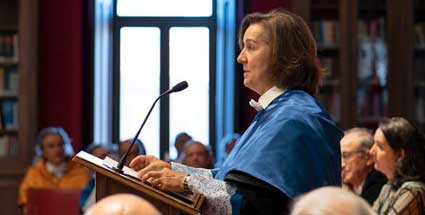
Pilar Vélez proclaims her passion for mathematics at the official opening of the 2022-2023 academic year
Devotion colored the atmosphere of the opening ceremony of the 2022-2023 academic year at the Madrid-Princesa Campus of Nebrija University. It was present in the gestures and in the words of the speeches of academic personalities and in the title of the inaugural lesson – Devotion to Mathematics. From great discoveries to the discovery of theorems – proclaimed by Pilar Vélez Melón, professor of Mathematics and director of the Mathematics and its Applications research group.
See news
